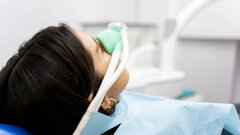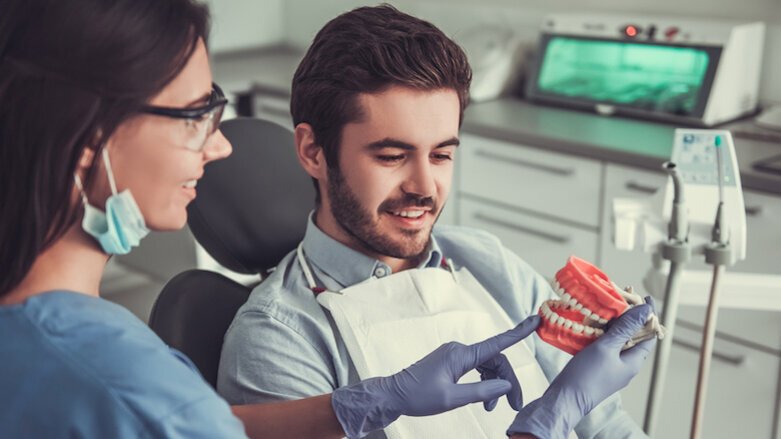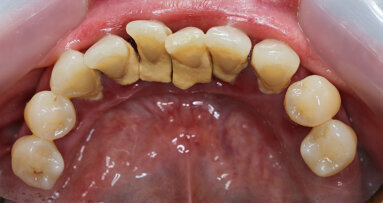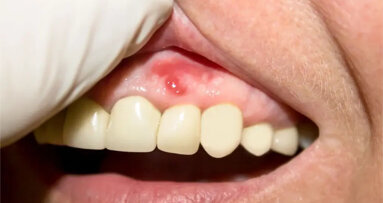LONDON, UK: As dentistry becomes more technologically advanced, the importance of having an informed patient continues to grow. With this in mind, a new study has found that using psychological techniques to communicate the risk of developing periodontal disease to patients improved their dental hygiene and was associated with reduced scores for gingivitis over a three-month period.
The study, which was led by a team from the Faculty of Dentistry, Oral and Craniofacial Sciences at King’s College London, tested a group of 97 adults with moderate periodontal disease who were registered patients at a London general dental practice. The participants received treatment as usual, an individualised report on their periodontal disease risk, or an individualised report plus a programme of goal setting, planning and self-monitoring based on psychological theory.
The results of the study showed that, over 12 weeks, dental plaque was reduced significantly in the two groups to whom risk of disease was communicated, but there was no change in the group who received treatment as usual. In addition, the frequency of interdental cleaning improved only in the intervention groups.
Lead author of the study Dr Koula Asimakopoulou, Reader in Health Psychology at King’s College London, said: “Our study shows that by adopting a simple psychological intervention, aided by the use of an online risk assessment tool, we can significantly improve measurable clinical outcomes and reduce initial signs of gum disease in patients seen routinely in general dental practice.”
Dr Matthew Nolan, the dental practitioner who delivered the intervention, added: “Shaping how health information is presented to our patients appears to influence their subsequent behaviour. Patients are naturally concerned about their risk of periodontal disease; we have found that coupling their concern with a structured discussion of coping strategies and simple behaviour change techniques may be a useful driving force in improving health outcomes within a routine dental consultation.”
“At a time when the best way to improve the periodontal health of the majority of people is being considered, this paper demonstrates how interdisciplinary teams of psychologists and dentists working together can deliver improvements in patients’ oral health and periodontal status,” added Dr Mark Ide, President of the British Society of Periodontology.
“Good daily oral care is a core element of achieving and maintaining good oral health, and this may have an impact on other aspects of health as well,” he concluded.
The study, titled “The effect of risk communication on periodontal treatment outcomes; A randomized controlled trial”, was published online in the Journal of Periodontology yesterday.
Tags:
LONDON, England: Although periapical periodontitis can increase systemic inflammation and is associated with cardiovascular risk and impaired glycaemic ...
LONDON, England: Periodontal treatment is known to trigger a short-term systemic inflammatory response, and the systemic effects of this have prompted ...
BIRMINGHAM, UK: In a recent study, researchers from the University of Birmingham examined the records of patients having a history of periodontal disease, ...
SENDAI, Japan: Researchers have discovered that soft gingiva hinders the development of gingiva fibroblasts. A study conducted at the Tohoku University in ...
LONDON, UK: Factors such as glucose metabolism, nutrition, oxidative stress and ageing drive periodontal progression. However, current periodontal ...
LONDON, England: More than a third of UK adults in a study by periodontal health brand Corsodyl experience bleeding gingivae at least once a month when they...
HAMBURG, Germany: Periodontal health can contribute to systemic conditions; recent research has found evidence about the links between gum disease and ...
LIVERPOOL/PLYMOUTH, UK: The connection between oral health and chronic disease has been increasingly supported by substantial evidence, revealing shared ...
CAMBRIDGE – Saturated fats in junk food have been associated with obesity, diabetes and hyperlipidaemia risk. Now, researchers from the University of ...
BRIGHTON, UK/ATLANTA, US: The incidence of thyroid cancer and meningioma is increasing globally. New research has found that repeated exposure to dental ...
Live webinar
Tue. 24 February 2026
6:00 pm UTC (London)
Prof. Dr. Markus B. Hürzeler
Live webinar
Tue. 24 February 2026
8:00 pm UTC (London)
Prof. Dr. Marcel A. Wainwright DDS, PhD
Live webinar
Wed. 25 February 2026
4:00 pm UTC (London)
Prof. Dr. Daniel Edelhoff
Live webinar
Wed. 25 February 2026
6:00 pm UTC (London)
Live webinar
Thu. 26 February 2026
1:00 am UTC (London)
Live webinar
Tue. 3 March 2026
4:00 pm UTC (London)
Dr. Omar Lugo Cirujano Maxilofacial
Live webinar
Wed. 4 March 2026
1:00 am UTC (London)
Dr. Vasiliki Maseli DDS, MS, EdM



 Austria / Österreich
Austria / Österreich
 Bosnia and Herzegovina / Босна и Херцеговина
Bosnia and Herzegovina / Босна и Херцеговина
 Bulgaria / България
Bulgaria / България
 Croatia / Hrvatska
Croatia / Hrvatska
 Czech Republic & Slovakia / Česká republika & Slovensko
Czech Republic & Slovakia / Česká republika & Slovensko
 France / France
France / France
 Germany / Deutschland
Germany / Deutschland
 Greece / ΕΛΛΑΔΑ
Greece / ΕΛΛΑΔΑ
 Hungary / Hungary
Hungary / Hungary
 Italy / Italia
Italy / Italia
 Netherlands / Nederland
Netherlands / Nederland
 Nordic / Nordic
Nordic / Nordic
 Poland / Polska
Poland / Polska
 Portugal / Portugal
Portugal / Portugal
 Romania & Moldova / România & Moldova
Romania & Moldova / România & Moldova
 Slovenia / Slovenija
Slovenia / Slovenija
 Serbia & Montenegro / Србија и Црна Гора
Serbia & Montenegro / Србија и Црна Гора
 Spain / España
Spain / España
 Switzerland / Schweiz
Switzerland / Schweiz
 Turkey / Türkiye
Turkey / Türkiye
 UK & Ireland / UK & Ireland
UK & Ireland / UK & Ireland
 International / International
International / International
 Brazil / Brasil
Brazil / Brasil
 Canada / Canada
Canada / Canada
 Latin America / Latinoamérica
Latin America / Latinoamérica
 USA / USA
USA / USA
 China / 中国
China / 中国
 India / भारत गणराज्य
India / भारत गणराज्य
 Pakistan / Pākistān
Pakistan / Pākistān
 Vietnam / Việt Nam
Vietnam / Việt Nam
 ASEAN / ASEAN
ASEAN / ASEAN
 Israel / מְדִינַת יִשְׂרָאֵל
Israel / מְדִינַת יִשְׂרָאֵל
 Algeria, Morocco & Tunisia / الجزائر والمغرب وتونس
Algeria, Morocco & Tunisia / الجزائر والمغرب وتونس
 Middle East / Middle East
Middle East / Middle East


















































To post a reply please login or register